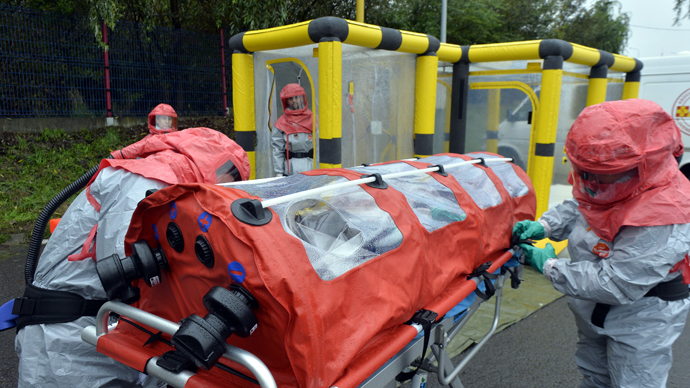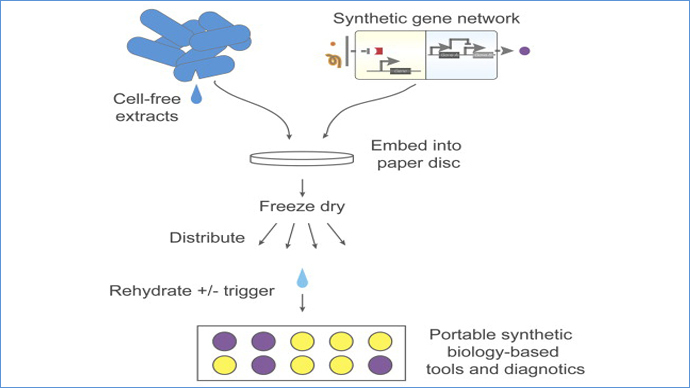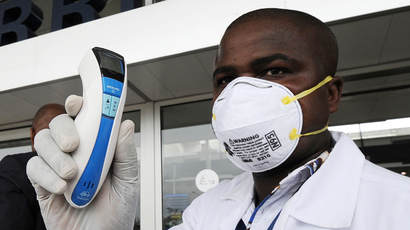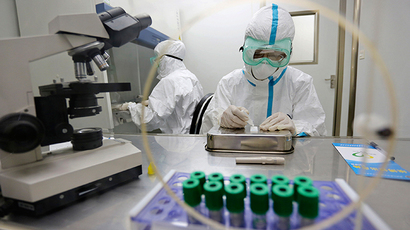Scientists create litmus-like paper Ebola tests taking 30 minutes

US scientists have invented a paper-based test for Ebola which takes just 30 minutes. The test-papers can be freeze-dried and stored at room temperature for up to a year and rehydrated with water whenever they are needed.
Two new studies in the Harvard University’s Wyss Institute for Biologically Inspired Engineering have elaborated a way to create a new synthetic gene compound and embed it onto small matrices of paper. It is activated with water which should contain bodily fluids, such as saliva or blood. If the target is present – such as a segment of Ebola RNA – the paper will change its color.
The scientists made the test in just 12 hours and it cost about $20. The method has been reported in the journal Cell.
The scientists created the Ebola sensor with the help of a "toehold switch," a new system for controlling gene expression that is very flexible and highly programmable.
READ MORE: US looking to boost production of experimental Ebola drug
The toehold switch was initially designed to work inside living cells, but one of the teams succeeded to transfer its function to the freeze-dried paper method.
The toehold switch can be programmed to give visual signs when it detects certain bacteria or viruses by an RNA signature of virtually any kind. RNA signatures are sequences of genetic code that can be used to identify a broad range of infectious agents, including bacteria, viruses, yeast and parasites.
The case includes a strain-specific Ebola sensor, which produces certain proteins only if it detects a particular Ebola strain. In this case, the protein changes the color of the paper from yellow to purple in less than an hour if one of two Ebola strains is detected. There are five strains of Ebola but the researchers worked with only two main ones.
READ MORE: British Big Pharma warns Ebola vaccine will come 'too late' to halt spread
"It's a platform for a new class of diagnostics, and a very clear and important practical extension of synthetic biology, opening up a whole generation of new technologies for diagnosis," team leader Jim Collins said.

Once made the paper–based tools can be freeze dried for safe room–temperature storage and shipping, maintaining their effectiveness for up to one year. To be activated, the freeze–dried paper need simply be rehydrated with water.
"We were surprised at how well these materials worked after being freeze dried," Collins told the BBC.
"Once they're rehydrated, these biological circuits function in these small paper disks as if they were inside a living cell."
READ MORE: ‘Good public health system - solution for Ebola containment’
One of the major advantages of this innovation is the extension of synthetic biology beyond laboratories.
“We’ve harnessed the genetic machinery of cells and embedded them in the fiber matrix of paper, which can then be freeze dried for storage and transport — we can now take synthetic biology out of the lab and use it anywhere to better understand our health and the environment,” said Keith Pardee, a colleague of Collins.
This technology is going to be inexpensive. Collins believes each slip of the detection paper would cost between 4 and 65 cents.
”This technology could truly set the stage for powerful, multiplex biological circuits and sensors that can be quickly and inexpensively assembled for transport and use anywhere in the world,” says the press release.













